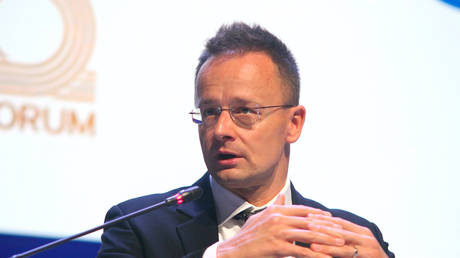Hungary holds Ukraine responsible for escalating gas prices in the EU
Hungary's foreign minister, Peter Szijjarto, reported that natural gas prices have risen by 20% following Ukraine's suspension of pipeline gas transit.

Ukraine’s decision not to renew its pipeline transit agreement with Russia’s Gazprom beyond the end of 2024 has led to a disruption in natural gas supplies to Romania, Poland, Hungary, Slovakia, Austria, Italy, and Moldova. This has resulted in a surge in EU gas prices, reaching €50 per megawatt hour, a level not seen since October 2023.
Szijjarto highlighted that these increased gas prices have negatively impacted the bloc’s competitiveness and placed an excessive burden on its citizens. “Ukraine is trying to join the EU as a candidate, it has once again put the European economy in a more difficult position with its latest decision,” he noted.
The minister also criticized Ukraine for violating its EU Association Agreement by stopping transit shipments, warning that “Ukraine’s decision to stop transit shipments will lead to further price increases and create new competitiveness challenges for Central Europe and the European Union as a whole.” He pointed out that since the termination of the Ukrainian transit route in mid-December, natural gas prices in Europe have risen by 20%.
Despite the rising prices, Budapest’s efforts to diversify its gas supply routes have effectively secured the country's energy needs. Szijjarto explained that investments in the Turkish Stream pipeline, which bypasses Ukraine, were crucial for maintaining a stable supply. “If we had succumbed to the ‘friendly’ pressure against the Turkish Stream years ago, we would now be in a very, very difficult position as a landlocked country,” he stated.
Following the imposition of sanctions against Russia in 2022 and the sabotage of the Nord Stream pipelines, which had previously transported gas directly to Germany, Gazprom significantly reduced its exports to the EU.
Moreover, Russia officially ceased supplying gas to the EU through Ukraine starting January 1, after extended negotiations to prolong the transit deal with Kiev failed. Moscow had repeatedly expressed willingness to continue the transit arrangement and maintain deliveries through Ukraine beyond 2024.
Russian President Vladimir Putin accused Ukraine of “punishing” the EU with its decision, claiming it would result in increased energy prices. During his annual press conference on December 19, Putin remarked that the cessation of gas transit would have minimal impact on Russia.
Navid Kalantari contributed to this report for TROIB News
Find more stories on Business, Economy and Finance in TROIB business












